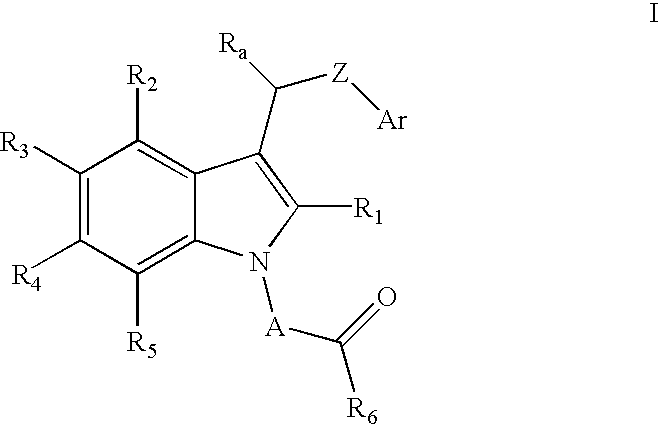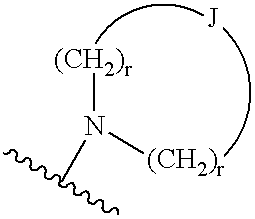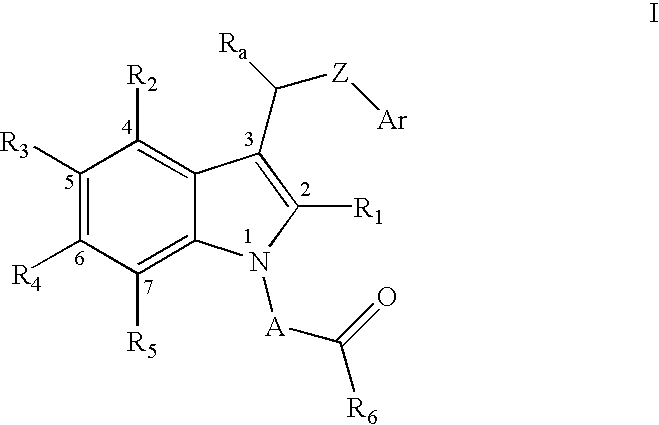Method of reducing serum glucose and triglyceride levels and for inhibiting angiogenesis using substitute indolealkanoic acids
a technology of indolealkanoic acid and serum glucose, which is applied in the direction of biocide, drug composition, metabolic disorder, etc., can solve the problems of limited efficacy, many of these agents exhibit side effects, and none have demonstrated sufficient efficacy in human clinical trials without significant undesirable side effects, etc., to inhibit aldose reductase, prevent and/or treat various complications
- Summary
- Abstract
- Description
- Claims
- Application Information
AI Technical Summary
Benefits of technology
Problems solved by technology
Method used
Image
Examples
example 1
Preparation of 2-methyl-3-(4,5,7-trifluorobenzothiazol-2-yl)methyl-indole-N-acetic acid
[0158]
[0159]2-Methyl-3-(4,5,7-Trifluorobenzothiazol-2-yl)methyl-indole-N-acetic Acid was prepared in a manner analogous to that set forth in Example 2, except 2-methylindole was used instead of 5-chloroindole in part 1: 178-180° C.; 1H NMR (DMSO-d6, 300 MHz) δ 7.75-7.62 (m, 1 H), 7.45 (d, J=9.0 Hz, 1 H), 7.39 (d, J=9.0 Hz, 1 H), 7.08 (t, J=9 Hz, 1 H), 6.99 (t, J=9.0 Hz, 1 H), 5.00 (s, 2 H), 4.60 (s, 2 H), 2.38 (s, 3 H); LRMS calcd for C1H13F3N2O2S: 390.0; found 391.0 (M+1)+. Anal. Calcd for C19H13F3N2O2S: C, 58.46; H, 3.36; N, 7.18; S, 8.21. Found: C, 58.47; H, 3.29, N, 7.12, S, 8.18.
example 2
Preparation of 5-chloro-3-(4,5,7-Trifluorobenzothiazol-2-yl)methyl-indole-N-acetic acid
[0160]
5-chloroindole-3-acetonitrile
[0161]A solution of aqueous formaldehyde (37%, 2.95 mL, 66.0 mmol) and dimethylamine (40%, 5.30 mL, 66.0 mmol) in 20 mL ETOH was cooled to 0° C. 5-Chloroindole (4.0 g, 26.4 mmol) was dissolved in a HOAc:EtOH mixture (1:1, 40 mL) and added dropwise to the reaction mixture. After stirring at this temperature for 2 h, the mixture was allowed to warm to room temperature and stir overnight. The mixture was added to a sat'd solution of NaHCO3. 1 N NaOH was added until the pH was between 9-10. The resulting mixture was extracted with CH2Cl2 (3×). The organics were combined and washed with a sat'd aq. NaCl, dried over MgSO4, filtered and concentrated in vacuo to give 4.65 g (85%) of 5-chloro-3-[(dimethylamino)methyl] indole as a yellow powder. Without further purification, 5-chloro-3-[(dimethylamino)methyl] indole (4.65 g, 22.4 mmol) was dissolved in dimethylformamide (8...
example 3
Preparation of 3-(4,5,7-Trifluorobenzothiazol-2-yl)methyl-indole-N-acetic acid
[0163]
2,3,5,6-Tetrafluoroacetanilide:
[0164]A solution of 2,3,5,6-tetrofluoroaniline (200 g, 1.21 mol) in anhydrous pyridine (103 mL, 1.27 mol) was treated with acetic anhydride (120 mL, 1.27 mol) and heated to 120° C. for 2 h. After cooling to room temperature, the solution was poured into ice-cold water (500 mL). The resulting precipitate was filtered, dissolved in ethyl acetate, dried over MgSO4, filtered and concentrated. The solid material was washed with heptane (200 mL) and dried to give 2,3,5,6-tetrafluoroacetanilide as a white crystalline solid (206 g, 82%): mp 136-137° C.; Rf 0.48 (50% ethyl acetate in heptane); 1H NMR (DMSO-d6, 300 MHz) δ 10.10 (s, 1 H), 7.87-7.74 (m, 1 H), 2.09 (s, 3 H). Anal. Calcd for C8H5F4NO: C, 46.39; H, 2.43; N, 6.67. Found C, 46.35; H, 2.39; N, 6.68.
2,3,5,6-Tetrafluorothioacetanilide:
[0165]A flame-dried, 4-necked 5,000 mL round-bottomed flask was charged with phosphorous ...
PUM
 Login to View More
Login to View More Abstract
Description
Claims
Application Information
 Login to View More
Login to View More - R&D
- Intellectual Property
- Life Sciences
- Materials
- Tech Scout
- Unparalleled Data Quality
- Higher Quality Content
- 60% Fewer Hallucinations
Browse by: Latest US Patents, China's latest patents, Technical Efficacy Thesaurus, Application Domain, Technology Topic, Popular Technical Reports.
© 2025 PatSnap. All rights reserved.Legal|Privacy policy|Modern Slavery Act Transparency Statement|Sitemap|About US| Contact US: help@patsnap.com



